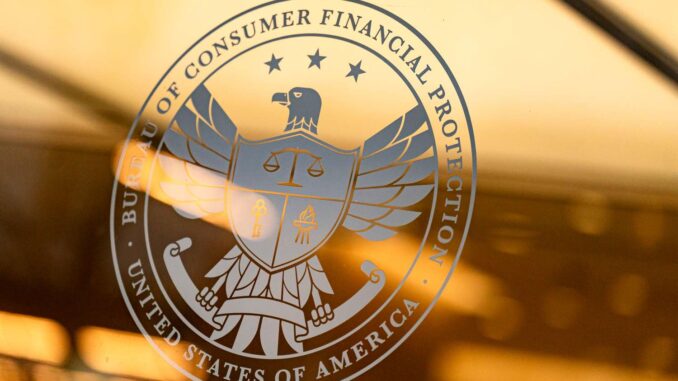
Main to remember
- The administration of Donald Trump eliminated the efforts of former president Joe Biden to brake what he called “unwanted costs”.
- The rules limiting the credit card of late costs, overdraft fees and the maintenance of medical debt on credit reports have all been put back.
- The prospects for a future administration reviving the Aggress CFPB of the Biden era are thin, said a former office official.
The judges and legislators have now reversed many attempts by former president Joe Biden to regulate how financial institutions treat their customers.
The latest defeat of the Biden consumer protection program occurred last week when a federal court canceled a rule created by the Consumer Financial Protection Office which has prohibited credit declaration agencies to include medical debt on credit reports.
During the Biden era, the CFPB capped overdraft costs at $ 5; Limited credit card delay fees at $ 8; I have taken measures to regulate payment applications as if they were banks; Nixée medical debt of credit reports; And continued large companies to mistreat customers.
In addition, the “Click to cancels” rule of the Federal Trade Commission would have forced companies to allow customers to give up easily. The rules were part of an effort at the administration scale to suppress what the White House called the “junk food costs”.
The Trump administration, the congress led by the Republicans and the judges have now distant all these rules and prosecution before being able to take effect, claiming that Biden regulators had exceeded their limits.
“The elections have consequences,” said David Silberman, who was an interim deputy director of the CFPB, appointed by former President Barack Obama. “It is not surprising that most efforts have not survived given the change of administration.”
Ordinary people are more at the mercy of the companies with which they do business, said Christine Hines, director of the main policies of the National Association of Consumer Advocates.
“It is to build a free for everyone for bad actors,” she said. “Consumers are generally in a very precarious place because some of these fundamental protections have been deleted.”
The junking of the “compensation fees” rules
Biden’s war against junk food fell quickly after Trump took office.
In April, a Federal Tribunal of Texas canceled the late fees of the credit card, the headquarters of banks and lenders who had continued to arrest it.
In May, Trump signed resolutions adopted by the Congress reversing the overdraft limit as well as a rule that would have submitted large payment suppliers like Venmo, Paypal and Google Pay to declaration requirements and exams similar to banks.
In July, a federal court canceled the click-channel rule, storing on the side of the groups of companies which had continued to arrest it.
The CFPB abandoned several prosecution by starting shortly after Trump took office, including the Agasint Walmart business, Capital One, Zelle and Navy Federal Credit Union. Christine Chen Zinner, main lawyer for consumer financial justice among Americans for financial reform, counted 22 abandoned costumes in addition to defeats and regulatory declines.
Opponents of the office, including the commercial groups representing banks, said that the rules would ultimately have harmed consumers.
“If the CFPB rule had entered into force, this would have led to later payments, lower credit scores, higher interest rates and a reduction in credit access for those who need it most,” the American Bankers Association said in an unconted statement after the decision on the credit card. “This would also have penalized the millions of Americans who pay their time credit card bills and reduces significant incentives for consumers to manage their finances.”
Consumer defenders do not see this in this way.
“We are incredibly disappointed to see so many CFPB rules that would have helped millions of people in the United States die in the fifth circuit,” said Zinner.
Several lasting effects survive
Biden’s attempts to curb financial costs were not completely unsuccessful.
Under pressure from the CFPB, many large banks have voluntarily limited the overdraft costs they invoiced to customers. The changes could allow customers about $ 4 billion in fees per year, according to an analysis in 2022 by the Charitable PEW Trust. And the main credit offices have ceased, including medical debt of less than $ 500 on credit reports.
Silberman said he expects these changes to be permanent.
Some states have resumed part of the place where the CFPB stopped, with at least 15 states pursuing their own rules prohibiting medical debt of credit reports.
What is the next step?
A future administration that thinks more of Biden than Trump on consumer protection problems could revive some of these efforts. But that could be difficult: Trump and his cost reduction working group, formerly led by Elon Musk, almost dismantled the CFPB.
Trump sought to dismiss 1,500 of office employees, leaving a workforce of only 200, according to reports by the Associated Press. In addition to that, Trump’s Bill and Trump expenses reduced the maximum budget budget to just over half of his old level.
Silberman said that a future CFPB is expected to re -hire staff and rebuild the lost infrastructure, which would not be easy in the best circumstances. Hiring can be particularly difficult as a result of mass layoffs.
“There will be a question of how many people would like to return to an agency after seeing what happened to him,” said Silberman.
